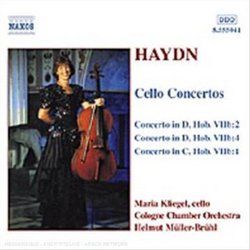| All Artists: Franz Joseph Haydn Title: Haydn: Cello Concertos Members Wishing: 1 Total Copies: 0 Label: Naxos Original Release Date: 1/1/2001 Re-Release Date: 10/16/2001 Genre: Classical Styles: Chamber Music, Forms & Genres, Concertos, Historical Periods, Classical (c.1770-1830), Instruments, Strings Number of Discs: 1 SwapaCD Credits: 1 UPC: 747313504121 |
Search - Franz Joseph Haydn :: Haydn: Cello Concertos
 | Franz Joseph Haydn Haydn: Cello Concertos Genre: Classical
|
Larger Image |
CD Details |
CD ReviewsUneven, overly romantic performance new music guy | NY, NY United States | 04/04/2002 (3 out of 5 stars) "Maria Kliegel is a master of cello playing. Her Naxos recordings are a treasurer-trove of incredible performances at a budget price. Her Kodaly sonata rivals Starker's, her Shostakovich concerti and Brahms sonatas rival Rostropovich. So it is with great reluctance that I must criticize this CD. What Kliegel can't seem to do is change her style of playing from the aformentioned Romantic works for these lighter classical pieces. The same romantic sound, complete with dark rich vibrato and dramatic shifts, simply doesn't work for Haydn. One can give an excellent performance of these concerti without being an expert in historical performance, but one still has to make concessions to the style and not play them as if they're Dvorak. In addition, it's always hit-or-miss with Naxos' orchestras, and this is a bad miss. The quality of sound is weak, with moments of highly questionable intonation. Skip this one." Maria Kliegel Plays Haydn Robin Friedman | Washington, D.C. United States | 10/21/2009 (5 out of 5 stars) "Haydn composed only a handful of stunning concertos, but at least two of them are for the cello. The cello concerto in D major Hob. VII 7b:2 and the cello concerto in C major Hob. VIIb:1 rank among Haydn's most beloved works and are staples in the relatively small repertoire of cello concertos. This is remarkable because the C major work was not discovered until 1961, while, until the 1950s, the authenticity of the D major concerto had been questioned.
Many formidable cellists have recorded these works, including, in this CD, Maria Kliegel together with the Cologne Chamber Orchestra conducted by Helmut-Muller Bruhl. Kliegel (b.1952) studied with Janos Starker and won a major international cello competition in 1981. Soon after that Mstislav Rostropovich became her mentor and champion. Known as "La Cellisima" to her admirers, Kliegel has recorded prolifically for Naxos. Aided by that label's budget price together with her own gifts, Kliegel, is likely the world's best-selling classical cellist. Her recording of the Haydn concertos dates from 2007. Kliegel offers a large, modernly idiomatic reading of these works. An almost romantic passion runs though these performances. Kliegel plays with a large tone, uses substantial vibrato, and even plays with rubato with some frequency. Listeners seeking period performances will not find them here. But I was inspired by her feeling and understanding for this music, her enthusiasm, and her tone. This is a lovely CD. Haydn's D major concerto is a work of his maturity dating from 1783. An autograph score was discovered in 1953, putting to rest questions about its authenticity. Most of Haydn's concertos date from the 1760s and tend to be baroque in style. But this work is a true concerto, highly symphonic and expansive. The opening movement, of about 16 minutes, is especially elaborate. The movement includes two contrasting themes, extended development passages, and a prominent, brilliant part for the soloist. Kliegel plays with beautiful tone and with emotional fervor highlighting the many double stops, large shifts in register, trills, and extended runs in the score. Kliegel brings a warm tone to the serenadingly lyrical second movement and returns to brilliantly virtuosic playing for the concluding rondo. This concerto is in the fully-developed classical style in that it brings unity out of contrasting musical materials. In interviews, Kliegel has stated that she approaches this work as showing the nature of the relationship between men and women. I found her performance glowing and convincing. Haydn's C major concerto is an early work, composed in the early 1760s and not discovered until 1961. Most of Haydn's concertos from this period receive little attention, but the cello concerto has become deservedly famous. It is a work of much more fire and spirit than its early companions. Even though written in a baroque style with alternating orchestral and solo passages, the cello stands out. The work begins with a festive opening movement with brilliant writing for the solo instrument. It is followed by a surprisingly lengthy and intense adagio and a virtuosic finale. We are fortunate that this early masterwork, long believed lost, has been recovered. Besides these two famous concertos, Kliegel also performs the cello concerto in D major, Hob. VIIb:4, which is a rarity. Although long attributed to Haydn, most contemporary scholars question the authenticity of this work. Regardless of authorship, it is a delightful work in a singing early classical style. Kliegel plays with the beauty and feeling that she brings to the two famous concertos. Kliegels recording of the Haydn concertos dates from 2000. It is available as a single CD or as part of a six-CD set of the complete Haydn concertos that Naxos released in 2009. Robin Friedman" |

 Track Listings (9) - Disc #1
Track Listings (9) - Disc #1